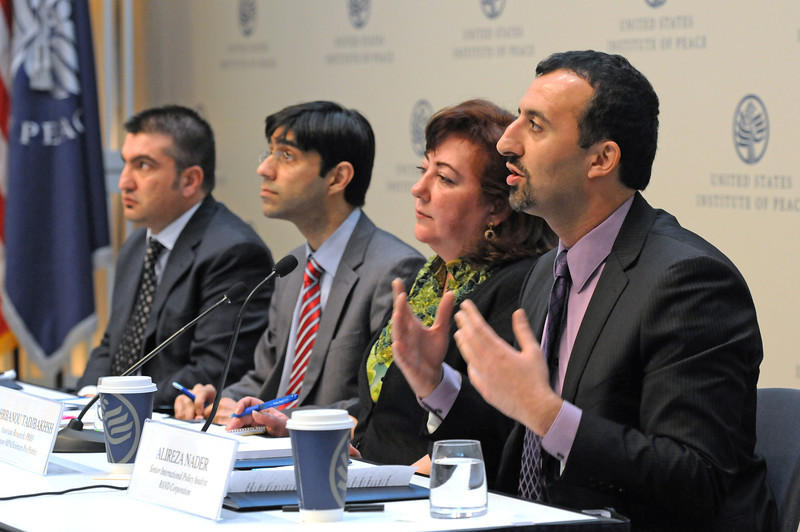Finding a Regional Solution for Afghanistan
On April 6, USIP's South Asia Adviser Moeed Yusuf; Abubakar Siddique, senior news correspondent for Radio Free Europe/Radio Liberty; Shahrbanou Tadjbakhsh, associate researcher at the Peace Research Institute Oslo and professor MPA at Sciences Po in Paris; and Alireza Nader, senior international policy analyst at the RAND Corporation discussed the various problems and potential solutions to improving cooperation and collaboration from Afghanistan's neighbors with the ultimate objective of promoting stability in the country to discuss how Afghanistan's immediate neighbors - Pakistan, Iran, and the bordering Central Asian Republics - view the present situation and impending security transition in Afghanistan, and what their role and policies are likely to be between now and 2014, and beyond.

As the 2014 security transition in Afghanistan approaches, multiple tracks need to be pursued to ensure sustainable peace in the country. A regional solution is often touted as a critical element in achieving such a peace. Without collaborative buy-in for such a solution, however, the potential increases that Afghanistan's neighbors will play a destabilizing role in the country given their own domestic and international objectives. Despite much debate on this issue, the core interests policies, and views of Afghanistan's neighboring states are still not well understood.
This conundrum prompted the U.S. Institute of Peace (USIP) on April 6 to convene experts to discuss how Afghanistan's immediate neighbors – Pakistan, Iran, and the bordering Central Asian Republics – view the present situation and impending transition in Afghanistan, and what their role and policies are likely to be between now and 2014, and beyond.
USIP's South Asia Adviser Moeed Yusuf; Abubakar Siddique, senior news correspondent for Radio Free Europe/Radio Liberty; Shahrbanou Tadjbakhsh, associate researcher at the Peace Research Institute Oslo and professor MPA at Sciences Po in Paris; and Alireza Nader, senior international policy analyst at the RAND Corporation discussed the various problems and potential solutions to improving cooperation and collaboration from Afghanistan's neighbors with the ultimate objective of promoting stability in the country.
Yusuf noted that there hasn't been enough work on attention on this issue, even though the common rhetoric – and conventional wisdom – is that Afghanistan's long-term peace and security will require a regional solution.
Siddique focused on Pakistan, saying that a settlement in Afghanistan is not in the hands of the U.S. but in the hands of Pakistan. "There can be no settlement unless Pakistan helps," he said. Furthermore, Pakistan will be the main beneficiary of any settlement – but first it needs to undertake some internal reforms – particularly in the Federally Administered Tribal Areas (FATA) region -- to help the settlement process.
Explore Further
-
Read the Peace Works, "Beyond Power-sharing: Institutional Options for an Afghan Peace Process"



